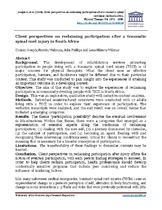| dc.contributor.author | Joseph, Conran | |
| dc.contributor.author | Wahman, Kerstin | |
| dc.contributor.author | Phillips, Julie | |
| dc.contributor.author | Wikmar, Lena Nilsson | |
| dc.date.accessioned | 2018-11-26T08:40:35Z | |
| dc.date.available | 2018-11-26T08:40:35Z | |
| dc.date.issued | 2016 | |
| dc.identifier.citation | Joseph, C. et al. (2018). Client perspectives on reclaiming participation after a traumatic spinal cord injury in South Africa. Physical Therapy, 96: 1372 – 1380. | en_US |
| dc.identifier.issn | 0031-9023 | |
| dc.identifier.uri | http://dx.doi.org/10.2522/ptj.20150258 | |
| dc.identifier.uri | http://hdl.handle.net/10566/4224 | |
| dc.description.abstract | BACKGROUND. The development of rehabilitation services promoting participation in people living with a traumatic spinal cord injury (TSCI) is of major concern for physical therapists. What the client sees as effective participation, barriers, and facilitators might be different due to their particular context. This study was conducted to gain insight into the experiences of attaining an important outcome in a developing context.
OBJECTIVE. The aim of this study was to explore the experiences of reclaiming participation in community-dwelling people with TSCI in South Africa.
DESIGN. This was an explorative, qualitative study with inductive content analysis.
METHODS. Individual semistructured interviews were conducted with 17 adults living with a TSCI in order to explore their experience of participation. The verbatim transcripts were analyzed, and the end result was an overall theme that included 4 emerging categories.
RESULTS. The theme “participation possibility” denotes the eventual involvement in life situations. Within this theme, there were 4 categories that emerged as a representation of essential aspects along the continuum of reclaiming participation: (1) dealing with the new self, (2) a journey dominated by obstacles, (3) the catalyst of participation, and (4) becoming an agent. Dealing with and recognizing these intervening conditions seem critical for clients to reconstruct the meaning that is necessary for a broader conception of participation.
Limitations. The transferability of these findings to dissimilar contexts may be limited.
CONCLUSION. Client perspectives on reclaiming participation after injury affirm the notion of eventual participation, with each person finding strategies to succeed. In order to help clients reclaim participation, health professionals should develop contextually sensitive programs that include peer mentoring and reduce the influence of hindering factors. | en_US |
| dc.language.iso | en | en_US |
| dc.publisher | Oxford University Press | en_US |
| dc.rights | This is the post-print version of the article published online at: http://dx.doi.org/10.2522/ptj.20150258 | |
| dc.subject | Traumatic Spinal Cord Injury | en_US |
| dc.subject | Rehabilitation services | en_US |
| dc.subject | South Africa | en_US |
| dc.title | Client perspectives on reclaiming participation after a traumatic spinal cord injury in South Africa | en_US |
| dc.type | Article | en_US |
| dc.privacy.showsubmitter | FALSE | |
| dc.status.ispeerreviewed | TRUE | |

